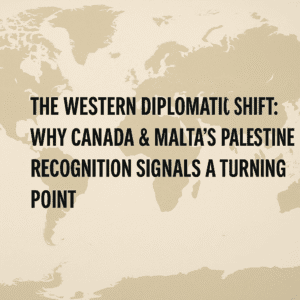The Western Diplomatic Shift: Why Canada & Malta’s Palestine Recognition Signals a Turning Point
Canada and Malta announced plans to formally recognize Palestinian statehood at September’s UN General Assembly, joining France and a conditionally committed UK. This coordinated move by Western nations significantly ramps up diplomatic pressure for a two-state solution, directly challenging Israel’s opposition.
Canada linked recognition to Palestinian elections excluding Hamas and future demilitarization, while the UK threatened recognition unless Israel agrees to a ceasefire within eight weeks. Malta framed its decision as a concrete step towards lasting peace. The announcements occurred during a major UN conference boycotted by Israel and the US, which produced declarations urging all nations to recognize Palestine and outlining a phased peace plan. This marks a notable shift, using recognition as leverage to break the conflict’s deadlock and isolate rejectionist stances. The coming UN gathering will be a critical test of this strategy’s impact.

The Western Diplomatic Shift: Why Canada & Malta’s Palestine Recognition Signals a Turning Point
The landscape of the Israeli-Palestinian conflict witnessed a significant tremor this week as two more Western nations, Canada and Malta, joined France in pledging to formally recognize the State of Palestine. This move, announced amidst a pivotal UN conference, signifies a notable shift in diplomatic pressure from historically cautious Western powers and intensifies the focus on a two-state solution ahead of September’s UN General Assembly.
Beyond Symbolism: A Calculated Diplomatic Push
While over 145 nations already recognize Palestine, the commitments from Canada (a G7 member) and Malta (an EU member state), following France’s lead, carry distinct weight within Western diplomatic circles. Their announcements weren’t made in isolation but during a high-profile UN conference specifically dedicated to reviving the two-state solution – a conference notably boycotted by Israel and the US.
- Canada’s Conditional Step: Prime Minister Mark Carney framed Canada’s planned September recognition as contingent on specific Palestinian actions: holding general elections in 2026 from which Hamas is excluded and the demilitarization of the future Palestinian state. This positions recognition not just as an endorsement, but as leverage for internal Palestinian reform and security guarantees.
- Malta’s Principled Stance: Malta’s Foreign Ministry official, Christopher Cutajar, emphasized recognition as a “concrete step towards the realization of a just and lasting peace,” moving the two-state solution “from theory into practice.” Malta framed its decision as a long-held belief in Palestinian self-determination.
- The UK’s Sword of Damocles: Adding further pressure, UK Prime Minister Keir Starmer declared Britain would recognize Palestine before September’s UN meeting unless Israel agrees to a ceasefire and commits to a long-term peace process within the next eight weeks. This creates a tangible, time-bound incentive for Israeli action.
The Core Demand: Turning Words into Reality
These announcements coalesce around a central theme articulated at the UN conference: the urgent need to translate the long-discussed two-state solution into a political reality. The resulting “New York Declaration” outlines a phased plan towards an independent, demilitarized Palestine coexisting peacefully with Israel. Crucially, a companion “New York Call” explicitly urged all nations yet to recognize Palestine to do so, labeling it “an essential step” towards peace. This document notably included signatures from several countries, like Australia and New Zealand, who haven’t yet taken that step themselves.
The Israeli Reaction & The Stakes
Israel’s response, delivered by Ambassador Danny Danon, was scathing. He condemned the conference and the recognition pledges as “hypocrisy,” “a waste of time,” and “appeasement” that legitimizes terrorism, particularly while Israeli hostages remain captive in Gaza. This starkly highlights the deep chasm in perspectives:
- The Western View: Recognition is a necessary diplomatic tool to break the status quo, empower moderate Palestinian leadership (implicitly sidelining Hamas), and create irreversible momentum towards negotiations.
- The Israeli View: Recognition rewards Palestinian actions (including Hamas’s October 7th attack) without addressing core Israeli security concerns or requiring direct concessions from the Palestinians first.
The Human Insight: Why This Moment Feels Different
This isn’t merely another UN resolution. The coordinated, public commitments from major Western allies represent a tangible shift:
- Frustration with Stalemate: Decades of failed negotiations and expanding settlements have eroded faith in the traditional peace process. Recognition is seen by many as a way to reset the parameters.
- Post-October 7th Reckoning: The horrific attack and the devastating war in Gaza have forced a global re-evaluation. Maintaining the pre-war status quo is increasingly viewed as unsustainable and dangerous. Recognition is part of a search for a new political horizon.
- Isolating Rejectionism: By moving collectively, these nations aim to isolate positions opposing a two-state solution (both Israeli and Palestinian extremist views) and create a critical mass that compels engagement.
- Pressure with Nuance: The conditions attached (especially by Canada and the UK) show recognition isn’t a blank check. It’s a calibrated attempt to use diplomatic recognition as leverage for specific, tangible steps towards peace and security for both peoples.
Looking Ahead: September and Beyond
All eyes now turn to September’s UN General Assembly. The formal recognitions by Canada, Malta, and France (and potentially the UK) will be highly symbolic moments. The key questions remain:
- Will the conditions set by Canada and the UK be met, and how will that impact their follow-through?
- Will other Western holdouts, like those who signed the “New York Call” but haven’t recognized Palestine (e.g., Australia, Finland, Portugal), feel pressured to join?
- Crucially, will this collective diplomatic pressure create enough momentum to force the major stakeholders – Israel, the Palestinians, and the absent US – back to meaningful negotiations based on the two-state framework?
The path remains fraught, but this week’s announcements mark a deliberate and significant escalation in Western diplomatic efforts to forge a different future, driven by a growing consensus that the old approaches have failed both Israelis and Palestinians. Recognition is now firmly on the table as a tool, not just an outcome.
You must be logged in to post a comment.